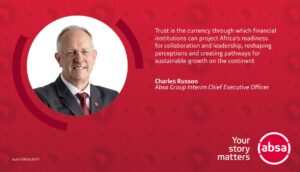The 55th World Economic Forum (WEF) Annual Meeting 2025 took place in Davos, Switzerland, from January 20 to 24 January 2025. Under the theme "Collaboration for the Intelligent Age," the event brought together leaders from various sectors, including business, government, civil society, media, and academia.
The discussions at the forum addressed a wide range of topics, balancing the challenges posed by geopolitical polarisation and societal divisions with the opportunities presented by innovation and technological advancements.
In addition to the main WEF programme, the Africa Collective, in partnership with the African Continental Free Trade Area (AfCFTA) Secretariat and Afreximbank as Host Partner, presented an expanded series of Africa-focused events. These included thematic roundtables and networking receptions. The organisation has partnered with private sector companies and media outlets.
Absa Group was represented at WEF 2025 by a delegation of senior executives, including interim CEO Charles Russon, Group Chief Strategy and Sustainability Officer Punki Modise, and Johnson Idesoh, Chief Information and Technology Officer.

Key themes included:
- Reimagining Growth: Attendees explored new sources of growth for the future, particularly focusing on the digital economy. According to McKinsey, this sector is projected to account for up to 70% of all new value created in the global economy over the next decade.
- Industries in the Intelligent Age: The forum examined how various sectors can adapt to and leverage emerging technologies, including artificial intelligence. The focus was on identifying the new tools necessary for success in an era where technology serves as the primary driver of change and disruption.
- Investing in People: Human capital development and addressing workforce challenges in the rapidly evolving job market were a key focus. Leaders explored comprehensive strategies to prepare the global workforce for the future, concentrating on five critical areas: reskilling and upskilling, AI and automation integration, inclusive workforce development, education system transformation and Human Capital investment.
- Safeguarding the Planet: Climate change and environmental sustainability remained at the forefront of discussions. Partnerships that enable investment and deployment of new climate technologies took centre stage as critical levers for meeting climate and nature-related goals. The Davos meeting followed two significant developments in global climate action: the establishment of the New Collective Quantified Goal on Climate Finance and the release of the first Biennial Enhanced Transparency Reports (BTRs). Discussions focused on scaling up ambition, governance, partnerships, and capital. These included; raising targets and commitments to address climate change, improving frameworks and policies for effective climate action, fostering collaboration between public and private sectors, and mobilising financial resources to support climate initiatives.
- Rebuilding Trust: The Edelman Trust Barometer for 2024 has highlighted that business is the most trusted institution globally, surpassing governments, media, and NGOs, increasing the responsibility on businesses to manage innovation in ways that benefit society at large. WEF 2025 also focussed on rebuilding trust in society.
.png)
.png)
.png)
.png)
.png)
.png)
.png)

.png)
.png)
